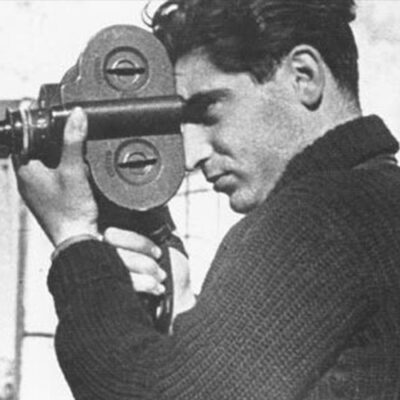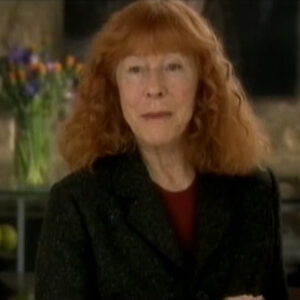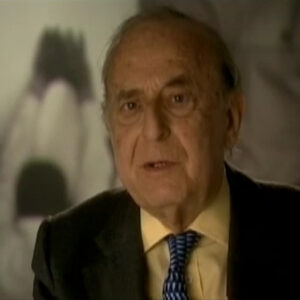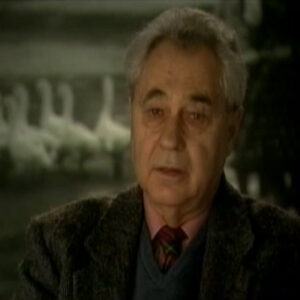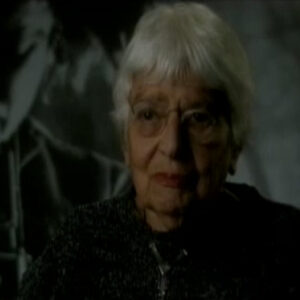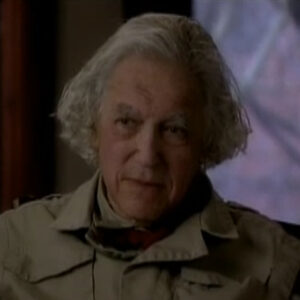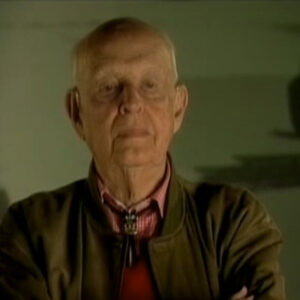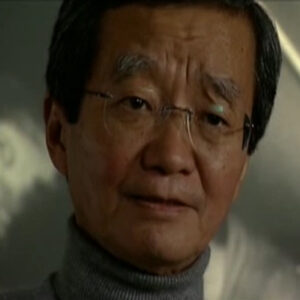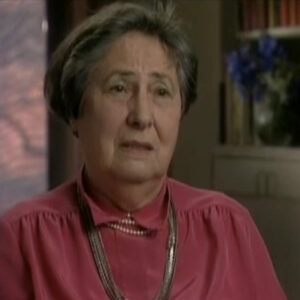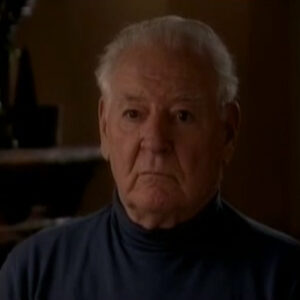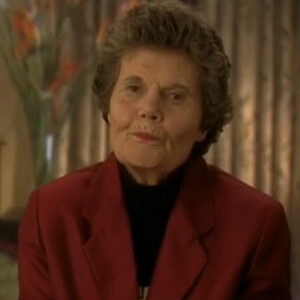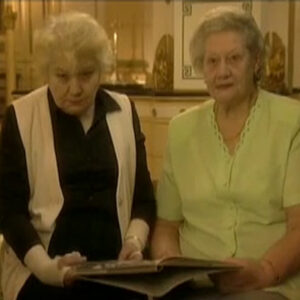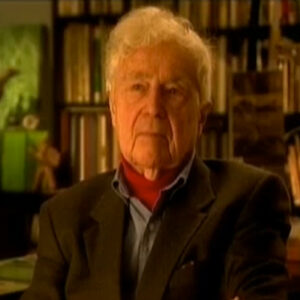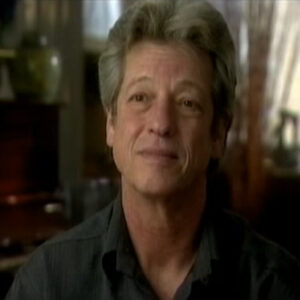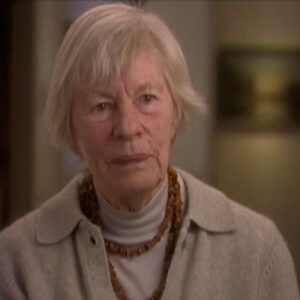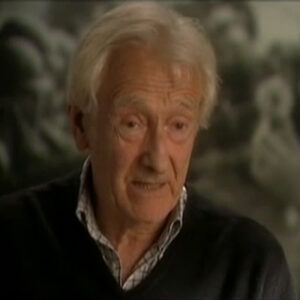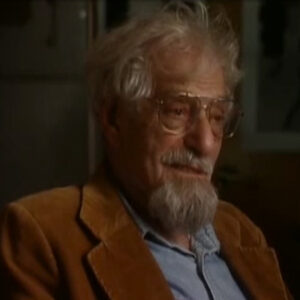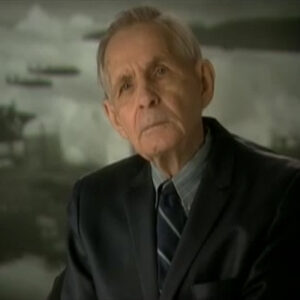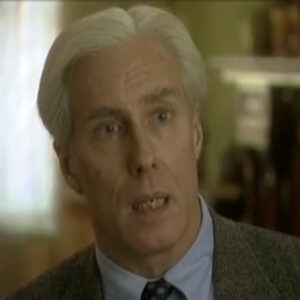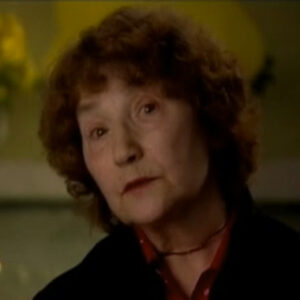Speaker So would you like to just start by talking about your mother?
Speaker My mother wrote her autobiography and in in in the preface she explains that the reason why she wrote it is that she knew that when she was dead, people would throw themselves for another life, taking information from gossip column, rumors and interviews. And my children cannot defend me because they would know the truth. So here it is. And so my mother wrote this biography for us.
Speaker And when I read the manuscript one night that my mother was quite spared, because obviously when you write your own life, you always feel maybe you breach somebody’s privacy. And when I read it, I found out that she was confessing to the affair that she had with Bob Capa, who I greatly admired. But I didn’t know about it. I vaguely knew there were friends that they knew we often had at home visits from Jim Seymour. But Capa was dead by the time I was two years old when he died. So I was quite surprised and went to my mom and said. Why do you watch how I know about this and how come you wrote it because you kept the secret so well and she said, I’ve always knew that I was not going to be able to keep the secret. And I was afraid Bob was so known and his legacy would live and would grow. And I thought that at least if it came out of me, somebody would have said something that would confine the rumors. I’m still surprised that there have been no rumors for they had their affair in the 40s and this book came out in the 70s. But for 30 years they were able to keep it from the public in spite of the fact that apparently Alfred Hitchcock wrote Rear Window, inspired to this love affair between my mother was a great Hollywood star and the great photographer, the war photographer, Bob Capa.
Speaker So I read it from my mother to keep it as she had wished for years without seeing it. We really.
Speaker So Mother Inmet Cappa, somebody will be moving this Sarah.
Speaker You can move and sit somewhere, no breathing with that and when you get back.
Speaker Yeah, OK.
Speaker Again. So Mother and Cappa met while my mother went to France to entertain the troops, the war had just finished a month earlier and she stopped at the Ritz Attell in Paris and she found under her pushed under the door a note that said subject dinner date, June 28, 1945, Paris, France, to miss Ingrid Bergman, part one.
Speaker This is a community effort. This community consists of Bob Capa and Irwin Shaw, too. Were planning on sending you flowers with this note, inviting you to dinner this evening. But after consultation, we discovered it was possible to pay for the flowers or the dinner or the dinner or the flower, but not both.
Speaker We took a vote and dinner won by a close margin.
Speaker Three. It was suggested that if you do not care for dinner, flower might be sent. No decision has been reached on this so far.
Speaker For besides flower, we have a lot of doubtful qualities. Five. If we write much more, we will have no conversation left as our supply of charm is limited. Six, we will call you at six 15 seven. We do not sleep sign worried.
Speaker Mom said, I obviously choose to have dinner. I prefer to eat rather than sit in a room at the Ritz Hotel staring at a bunch of flowers.
Speaker So she went to dinner and found both bottlecap and overinsured, quite charming. And that was the beginning of of a friendship. And then they fell in love.
Speaker And our mother says that this part of being in love with Kapre while she was married with Peter Lindström and having a little child here was not easy.
Speaker Not easy at all, she says, because I was so moral, so prudish, you might say it was difficult for him to somehow, I think because he also knew it was very important. But I wanted very much to be with him. It was an adventurous, freedom loving men. Money didn’t mean anything to him. He was terribly generous.
Speaker And then he goes on telling of that. Once he took a walk in Hyde Park and they saw a bomb, a homeless person asleep.
Speaker And Bob Capa said, oh, let’s surprise him just for something is stuck to the back of the book. OK, after do one for one fifty.
Speaker OK, ready. So my mother writes, Well, naturally, you know what I choose, I prefer to eat rather than sit in a room at the Ritz Hotel staring at a bunch of flowers.
Speaker So she went to dinner and she found PopCap tremendously charming and amusing. And in fact, she fell in love with him. And that, she said, was very, very difficult.
Speaker Now, I’ve lost my book.
Speaker I lost the weight and I lost a note. I must have.
Speaker Yeah, to.
Speaker So should I start again from the same page? Sorry, sorry, I do this to find and I’m sorry that he was the one 50 was the other one. OK.
Speaker So my mother said, well, naturally, so my mother said, well, naturally, you know what I choose? I prefer to eat rather than sit in a room at the Ritz Hotel staring at a bunch of flowers.
Speaker So she went out to dinner and found Kapper. Incredibly charming fact she fell in love with him and she proceeded her book saying that part was not easy, not easy at all, because I was so moral, so prudish.
Speaker You might say it was difficult for him to somehow, I think, because he also knew it was very important. But I wanted very much to be with him. It was adventurous, very loving men. Money didn’t mean anything to him. It was terribly generous.
Speaker And she goes on describing that once when they were in Hyde Park in London, they walked past a bum. A homeless person was asleep. And Bob said, wouldn’t it be great if I could surprise him? And when he wakes up, will find lots of money in his hands and he put the feel this money. I feel his hand with money. Later on, when mother was collecting some clothes for Europeans, bombed Europeans, Kapa came and gave a suit and mother said, But you want to give a suit. You don’t have many suits and you may want to keep it. Give me something, a sweater or something simpler. And he said, No, no, I have three suit. I don’t need more than two. And she talks about a famous actor who might have a two or 300 suit who said, Well, Ingrid, I don’t know if I want to get rid of them because you never know, I might need one or he was incredibly generous and that what appealed my mother so much. But mother was ready to ask for a divorce and marry Casper.
Speaker But Cappa said he told me, I cannot marry you. I cannot tie myself down. If they say Korea tomorrow and we’re married and have a child, I won’t be able to go to Korea. And that’s impossible. I’m not the marrying kind. In my mind, my mother said, according to my background, you married a man you love. So that was very difficult. He went away and came back again. He went away and came back again. But nothing was ever going to change. And I understood that.
Speaker And so they did not get married. There is a nice letter that I would like to read that mother kept among of the many letters that Kapper wrote and one of them. He is in France and a mother is in Hollywood. And I quote, Part of the letter is describing that he is going off to one of his trips. And I say about incapacities, about mother, I hope you did not sign hundreds of contracts to become less and less of a human being and more and more of an institution.
Speaker You have to be very careful because success is much more dangerous and corrupting than disaster. And I would hate that that stopped. Now, I had to stop that.
Speaker But let’s go back to the beginning of that letter and do it as well. OK.
Speaker This is part of the letter that I’m going to quote, but it’s quite charming and quite telling us to capture. He writes, I hope you do not sign hundreds of contracts to become less and less of a human being and more and more of an institution. You have to be very careful because success is much more dangerous and corrupting than disaster. And I would hate oh, no, I stop.
Speaker That was emerging. I was in a very difficult and nearly pompous sentence. My ink is drying and I have just to talk to you on the phone, my dear, made from Hollywood via Sweden, I will see Joan referring to Joan of Arc, one of my other films. And if Gods and the Guardians allow it. I love you very much, Bob.
Speaker Heartbreaking that it didn’t. We didn’t become more well. I don’t know.
Speaker It is not for me, I guess I wouldn’t have been born. I think I think my mother during that period during the end of the war, went one day to see Rome Open City, my father’s film that was about the war.
Speaker And it was a new film style that was referrers neorealism. But if you look at Robert Copac Achebe, I saw photos. It looks very much like a realistic film becomes like those photos came to life, came to moving. And I think mother went to see Rome Open City and. She starts a biography with that because she says it was the most important event in her life. She looked at that film and wanted to be in that film.
Speaker And I’m sure that having been with Cappa for years, wishing to marry him, all of a sudden she’s so Kappus photos and her to be able to participate in that type of life that she admires so much. And she wrote a letter to my dad to work with him. And in fact, they did work. But they also fell in love and had the three of us three children and they had three children and five films together. So if Mother would have married Cappa, I wouldn’t be born great.
Speaker So that’s so it was almost like she walked into a couple of photographs.
Speaker I think so she doesn’t say that in a book, she doesn’t say that my father’s film was similar to Cap Power, but it’s more of my theory. I have to say, when I looked at these images of war, you reminds me very much of my dad’s film or that sense that images that with images you can communicate so much up to. Before photography, you only had the written word used who you needed a culture to access, information you needed. You have to be literate. You have to go to school and read and write. But all of a sudden, with film or photography, you could have an instant communication and an understanding of of of a situation without a culture. The culture was available to everybody. I think there was a sense of democracy in the images, still pictures and films and cappa like my dad used this power of photos not to entertain, but to rise consciousness, rise knowledge.
Speaker I don’t know if you can say more about what’s wonderful about the stylistic comparisons of the black and white films and the things that they were looking at.
Speaker Well, I think the black and white, it was because it was not to technology discovered on colored film. We call it still photos. And yet I think that the power of this black and white images, especially of the Second World War, is how we have a collective memory. I was born right after the war, so I didn’t witness the war. And yet. The testimony of people that live the war was so fresh, and yet when I think of it, I think of black and white and I think a lot of people of my generation, I don’t know the people that lived through the war, they might remember it in color, as it really was. But for people like me that were born right after the war, the memory of the war is in black and white because of the power of photo photographers such as such as Kapa. I think that images is so strong that even Steven Spielberg felt compelled to do Schindler’s List in black and white. It’s I think I do think there is a collective memory of the war that has been imposed by Bob Capa’s photograph, and that’s black and white.
Speaker That is great. That was great because you’re just terrific. I read I think it’s in your mother’s book that.
Speaker Cappa had changed her that she hadn’t changed him, but that he had changed her. She says something like my mother. The Hungarian the Hungarian is very much with me or, you know, something like that. I don’t know if you remember that. I don’t remember that.
Speaker I’m sorry. I haven’t you know, maybe it’s here.
Speaker If you know the page, we can I can read it and I can either read it or tell you hand.
Speaker But I’m just wondering, I guess you’ve touched on it a little bit, that thing with Cathy. But she saw a way to.
Speaker To have a more a richer life, the.
Speaker Yeah, I guess what I’m looking for is the fact that he may have had her, you know, I wasn’t born and I didn’t even know that they had an affair. So it’s I imagine it’s quite hard to comment on it. I think that PopCap enriched our life even for people that didn’t know him. We met him. So imagine how enriching he must have been for my mom, who met him and had him in flesh and blood in front of him.
Speaker And it’s known I mean, I haven’t met one person who didn’t say how charming it was, amused me to know that they talked about the way he spoke as Japanese, his own language, because he mixed so many language. I am sure that he was incredibly generous because you see that in his photographs, you cannot imagine somebody risking his life. And wanting to be in front of tragedy, if it wasn’t somebody incredibly empathic and incredibly generous and incredibly compassionate to survive it. You know, we generally ran away from tragedies. So I’m sure that Bob Coupa must have been. A great influence of my mother, as she had been to other people as sort of a great spirit, great generosity, and that’s what she says over and over in her book, how wonderful it was to be close to a man that didn’t care about money, didn’t care about career, didn’t care. It was all for life with such great generosity and enthusiasm.
Speaker Terrific.
Speaker What do you think she told Hitchcock or what parts of her story made it into a real winner?
Speaker I really don’t know everything anything about her rear window. I was oh, so the film and thought the film was wonderful.
Speaker And later on, I mean, way before my mother’s book, a week after my mother’s book.
Speaker So, you know, when I was when everybody might have been dead for 20 or 30 years, somebody said, oh, but Rear Window was inspired to the love affair between your mom, whose Grace Kelly in the film, a beauty socialite and great, elegant lady, and this war photography photographer, Jimmy Stewart for sure.
Speaker I mean, I understand that is a very romantic idea of a great actress that represents fiction and dream and entertainment to be in love with somebody who is such a heavyweight. The combination, it’s fascinating.
Speaker And I think that’s why my mother I think she loved him very much. She had told me many times that she was ready to divorce Peter, her husband, to marry Cappa. But but she knew she knew that the combination of the two and her legacy and her reputation one day would would enflame people’s imagination. And then the only source would be gossip of our dream about them, as if it’s true that Hitchcock was inspired by them. She must have seen the hint of it already there in their windows. So that’s why she wrote it and she confessed to it in a book.
Speaker There’s actually a line that Jimmy Stewart says that is almost the same as that letter. You know, it’s like, well, what if I actually said, what if I have to go off to Pakistan?
Speaker I really, really. Jimmy Stewart says the CIA forgot. I forgot. You know, it’s. It’s hard to be the child because I’m always asked to talk about my parents and I wasn’t born with my mother, created her legendary reputation in Hollywood. I was born after the years in Hollywood and I was born after my father made an unrealistic film and I was two years old.
Speaker Woodchopper died and I was six years old, which say more die died. And the only so and often because they’ve made that reputation exactly. During that period. And I’m one of the survivors, but I was one or two, so I do not have direct memories. The only thing I remember Chhim, I remember him because he had his big, big lips and big glasses. And I remember him walking funny around the house, always with a smile and taking photos. And I remember this tremendous warmth that came out of my mother when she was around. And he must have been close to cuppers death because Jim died also in a war a few years after. I think he survived a couple of three or four years, not much more. So it must have been in that period. And I just remember vaguely that warmth and that bond that was between the two.
Speaker And he and Kevin were like brothers.
Speaker So, yes, I’m sure that they hang out and I guess my dad was tremendously jealous and didn’t want my mother to work in the director’s film, though, but he did allow it to work with director that he loved Myard. So he did allow my mother to work with Jovanna, for example, and he did accept, Jim, say more to be around us, because I have no doubt that my father had immense admiration for Bob Capa. And my father was a great friend of Cartier-Bresson. So I’m sure that they were all connected.
Speaker You’ve talked a lot about Kappus qualities, but I’m wondering if you have something you might share about what it was in your mother that responded to those, and I don’t I don’t want to speculate.
Speaker I think I’ve said everything actually before because you wrote that letter saying what I love is your very mind.
Speaker You know what, not not speculate, but maybe describe your mother’s sense of humor or what she was like that would have connected with.
Speaker And I’d rather not, because then it becomes that part of life that it is all romance and and, you know, it’s one way if they want to do if you want to invent a fiction like Rear Window, it’s all right. When you talk about the real people, I think you have to stick to facts as much as we can. So I stick to facts and I read mother’s book. Oh, yes, that I.
Speaker I wanted to ask that you have covered.
Speaker I think you did cover this, but I’ll just put it out there. You have written somewhere or somebody wrote down that you said that Cappell was a hero for you even though you hadn’t met him.
Speaker And I think you may have answered that, but, yes, um, I was born in 1952, so it was right after the war and, um, as a child.
Speaker I remember very tangible, the fear of war and the fact that my family, especially my my dad, my dad and my aunt and from the Italian side of the family, more than mother, because mother obviously was Swedish. And so it wasn’t in a war. And then she was in Hollywood during the war and she hadn’t gone back to Europe for about eight years.
Speaker But I remember it was very tangible, the fear of the war and what they have suffered and to me, the photo, the photos of Kayapo timesaver of America. So help me understand on. What was this tremendous fear, this tremendous sadness that I sensed in my aunt, in my dad, in some of their friends to silence around a table?
Speaker Um, the little ritual, very unusual. Once a week, we didn’t eat. We were fasting.
Speaker And I remember it that we were fasting because just in case there was a war and we weren’t going to be able to eat every day, just, you know, keep the training up for little things like that that are completely gone in the generation. You know, I don’t fast my children once a week they eat hot dogs, potato chips or a fight perhaps for them to eat healthy. That’s our struggle. But the generation before had been starved and we children of that generation had not been starved.
Speaker But it was you know, we were witnessing what it meant and we sensed it. And it was the photography of cap him say more getable. So they gave me the first information, the first dimension of that tragedy. And then eventually my father’s films do me a realistic film, but it’s almost simpler in a photo. A photo is one frame. There is no words and you understand it emotionally. You don’t understand. You don’t have to understand the language or catch the words or read the subtitle. It’s immediate and it’s intangible and it’s ephemeral, but it can be quite powerful.
Speaker It’s been said that Kappler had to tell a story through photographs because he had no language.
Speaker Yes, that’s right. And nobody spoke. Well, he apparently not even spoke, Gary, and he spoke Japanese. So you have to speak in images because it wouldn’t have been able to express himself.
Speaker So I have to say that when I read this letter that he wrote to my mother, they were quite well written. I thought they were amusing, funny, very alive.
Speaker His character came across and I wish he had written more because I think he could have expressed himself as well as he did in his photos and wanted his biography was great, slightly out of focus, which I’m sure he wrote himself.
Speaker Maybe somebody corrected. The spelling is absolutely delightful, humorous light about such enormous tragedy.

